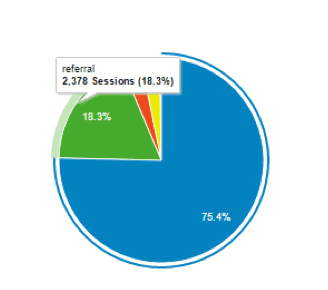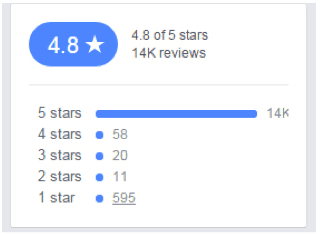Don't let your digital marketing campaigns fall foul of these mistakes
The great thing about making a mess of a digital marketing campaign is that, with the benefit of hindsight, it becomes clear which actions were a mistake and which contributed to a winning campaign.
In this article we share some examples of 'epic fails' that we have seen, and yes, if truth were told, we might have just had an up close and personal experience of some of them.
1. Leaving it to the boss to decide your Digital Marketing Strategy, i.e. – Ego Marketing
The boss is not always right! Come on, repeat after me “the boss is not always right!
Their input is necessary and important, however, they aren’t the ones who are being held responsible for your Digital Marketing Strategies. You are the one that is supposed to know better in this regard, but sometimes the Boss just can’t help it … they insist you do something because they want it, or think it is important. Over-spending on PPC campaigns for keywords that they insist you be found for even though they yield ZERO return is a prime example. Be guided by them, but set your strategy and tactics to acheive it based on your knowledge and experience.
2. Negative PR hacks; buying fake Yelp reviews, fake social media followers, Facebook likes, or 5,000 Twitter followers for €25.
Fake social media validation is really easy to spot. If the numbers of followers for a product / brand or person look too good to be true, then they probably are! Time and time again marketing companies have sought to artificially inflate the perceived social media impact of a particular Twitter / Facebook / Instagram account.

It is really easy to use tools to assess the validity of someone’s social media accounts. NB this is not something we have ever done, but we have analysed other people’s social media followings and realised they are too good to be true.
3. Not using Google Translate very carefully
Google Translate is an evolving algorithm. It is getting better and better, but more so in the most heavily used languages. For less used languages the results are still variable, and potentially somewhere from hilarious to seriously damaging to your business. Better to work with a native speaker of the language you are looking to translate your content into, rather than leave it up to the lottery of Google Translate.
4. Not using 301 redirects when you have changed web address or navigation links
It’s inevitable that at some point you will want to redesign your website, and possibly even change your hosting company, and even your domain name. What you don’t want to do is to destroy all the good work you have done previously in building up your online reputation. Despite this you will probably be unsurprised to know that some companies forgot to develop a site migration plan specfying 301 permanent redirects to map the old site pages onto the new addresses. They then had to spend serious amounts of money on advertising to redress the self-inflicted destruction of their online website rankings.

Ryanair is one of the many high-profile organisations who forget this basic rule of SEO. When they launched their new website in 2014 they didn’t redirect their URLs correctly. This resulted in a drop in keyword rankings for many of their prized keywords.
Use robots.txt or robot meta tags to keep your landing pages out of the Search Engine indices. Getting your site into Google’s index is always important, but if you have landing pages designed specifically around marketing campaigns like PPC, Display or Remarketing, the last thing you want is for an Organic visitor to come in because Google indexed the page. Advertising landing pages often have more aggressive sales tactics applied to their layout and messaging and it could be off-putting for an organic visit to have a pushy salesman greet them at the door. Using your robots.txt file or meta robots tag to instruct search engines not to index those landing pages means that even if they are already in the search engine index, they will be removed eventually and if not in the indices then they never will be.
5. Ignoring your data
Google Analytics, as well as Twitter, Facebook, Instagram, WordPress and every good social media platform, generate data on what happens when people engage with your social media accounts. This data can do a whole lot more than create pretty reports and boring stats. You need to get data on EVERYTHING. It is better to have the data and not use it than to need the data and not have it. We have seen companies whose data, if they looked at it, showed that their campaigns were massive with female teenagers in Spain despite the fact they were trying to sell software to Irish school principals.

What's most important is to use aActionable analytics, i.e. to define set targets and KPIs based on this data. Moving goalposts is only fun for the sadistic!
6. Leaving your social media to the interns
It happens all the time. The thing is, what are you paying your interns? Nothing? Coffee? Bus tickets? Interns have as much invested in your company as you are paying them. Think about that very carefully. Social media is often seen as an afterthought, ‘oh and we better do some Social too’. 
If that’s the attitude then you will suffer at the hands of professionals who are using the data effectively (see 5.)
7. Doing Social just because someone said you need to do Social
Is this a campaign that really needs a digital marketing aspect? Naturally we are big advocates of the value and impact that a well-crafted social media campaign can have. However in some markets it just might not be right to reach your target audience. You must always be where your customers, potential and actual, are. If you are trying to reach a Chinese audience then it’s important to remember which social media platforms are currently blocked in China (Facebook ads might not be the best use of your budget in this case).
8. Launching campaigns without understanding who your customer is
The best, funniest, most entertaining campaign in the world will be an expensive waste of your marketing budget if you have not spent the time to really understand your market and who your potential customers are. Getting out of the building and talking to people can give you really good, meaningful insights. This is worth more to you than just hunches and feelings about what might work. The data is good enough now to really hone in on who is buying your products, their gender, age, education, geolocation, and device used … it’s all accessible to you, so use it. Using digital marketing planning frameworks can help to garner this data and use it as a basis for your digital marketing strategy.
9. Don’t annoy vegans, PETA or any other interest group unnecessarily. Use humour very carefully
There are many great examples of this, but we love this story from the White Moose Café in Ireland. They stated in jest, on their Facebook page, that they were going to shoot vegans on-site at their Café.

Unsurprisingly, they ended getting lots (550+) of 1 star negative reviews because of it.

It can be cool to be humorous in the right way, but just think it through, who you might be offending, and what that might it do to your business.
10. Leaving a campaign running for long periods of time without checking the data
Data can be checked on a daily, hourly and even quarter hourly basis. If you don’t look at this you can run through an advertising budget very quickly with no useful results.
11. Writing content the search engine you want to rank in, rather than the audience you want to attract.
Search Engine Optimisation usually revolves around one core concept … Content is King. That is absolutely correct, but make sure the content you are creating has value and a purpose for your HUMAN visitors.

Too often we see websites that might be a tad bit repetitious of certain words and phrases thinking that this is the way to get indexed for a certain word or phrase. It is annoying to read and easy for search engines to spot. It is NOT a good practice and can not only get your content not indexed, but could get your site penalised and either not ranked well or removed altogether.
12. Following the latest social media trends that are not right for your business
Just because something works well for your rivals it might not be the best one for your company. You should have a clear sense of where your customers are, and where you get the most engagement, and be targeting these platforms for your content and advertising campaigns.
13. Remember your goals when writing your content … just don’t make your content ALL about your goals
We have seen some companies writing really interesting articles online, however they have no call to action that relates to the services or products that the company is trying to sell. This can be good for brand awareness but of little value to actually converting this interest into sales. It’s important to remember why you are trying to achieve good social media interaction. Likes, retweets and sharing should all be the means to an end rather than something to be pursued for their own sake. We’re not suggesting that you use aggressive sales tactics here, but there is nothing wrong with tying in your service/product offering in with the article, especially if it directly relates you’re your service/product
14. Giving too much away for free by putting all your eggs in one basket or all your content in downloads
Many sites have a wealth of information available in downloadable files, whether they be PDFs, documents, spreadsheets, slides, videos, podcasts, images, infographics … well you get the idea. The downloads are attractive resources to visitors and have a real purpose and value to them, however the last thing you want is to have them indexed in the Search Engines. The reason for this is that you will have missed your opportunity to engage with a visitor and potential buyer/subscriber/client if they find your content inventory available for download directly within the search engine results page. Keep that content available, but have specific landing pages that describe the download textually, have that page indexed, and make sure you exclude the actual resource using your robots.txt file. Not only will this enable you to engage with anyone wanting your content, you can also now track the visits to your site and the downloads of your resource within analytics, which you couldn’t before.

Randall Glick is a digital marketing lecturer at
Digital Skills Academy. He has been working in online and digital since 1999 and has worked with start-ups, SMEs, international and multinational organisations on their digital Strategies.










 Randall Glick is a digital marketing lecturer at
Randall Glick is a digital marketing lecturer at 



